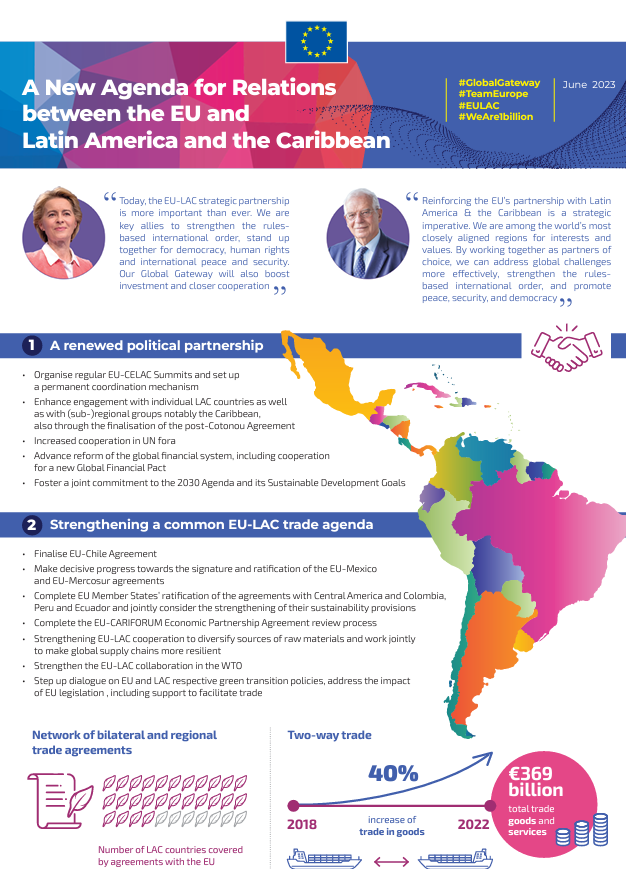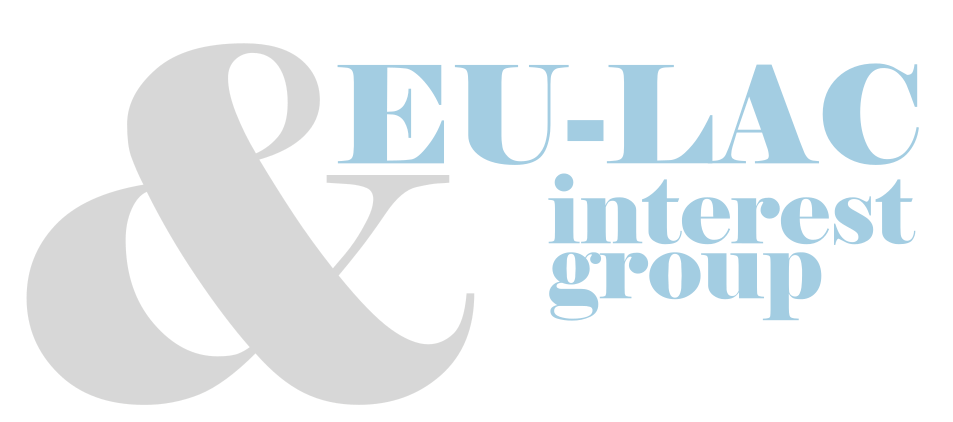New Agenda to strengthen EU's partnership with Latin America and the Caribbean

The High Representative and the European Commission have adopted a Joint Communication setting out a New Agenda for Relations between the EU and Latin America and the Caribbean. It proposes a stronger and modernised strategic partnership, through reinforced political engagement, boosting trade and investment, and building more sustainable, fair and inter-connected societies through Global Gateway investments.
President Ursula von der Leyen said: “Today, the EU–LAC strategic partnership is more important than ever. We are key allies to strengthen the rules-based international order, stand up together for democracy, human rights and international peace and security. We also have an interest in strengthening our political partnership and engagement, fight climate change and to take forward an inclusive, human-centred digital transformation. Our Global Gateway will also boost investment and closer cooperation.”
Launched ahead of the EU-CELAC Summit to be held in Brussels on 17 and 18 July, the Communication aims to recalibrate and renew bi-regional relations. It makes a series of proposals in key areas:
- A renewed political partnership;
- Strengthening common trade agenda;
- Rolling out Global Gateway investment strategy to accelerate a fair green and digital transition and tackle inequalities;
- Joining forces for justice, citizen security and the fight against transnational organised crime;
- Working together to promote peace and security, democracy, rule of law, human rights and humanitarian aid;
- Building a vibrant people-to-people partnership.
Key proposals
Political partnership: The Communication calls for renewed political engagement in a flexible and multi-layered approach: between the two regions, with individual Latin American and Caribbean countries, with sub-regions and in multilateral fora.
At bi-regional level, it proposes to enhance dialogue between the EU and the Community of Latin American and Caribbean States (CELAC), with more regular Summits and a permanent coordination mechanism.
At sub-regional level, the Caribbean merits increased political attention notably through the finalisation of the post-Cotonou Agreement, in addition to engagement with other sub-regional groups such as Mercosur, the Central American Integration System (SICA), the Andean Community or the Pacific Alliance.
At the level of bilateral relations, relaunching Summits with strategic partners Brazil and Mexico, as well as establishing political dialogue mechanisms with a number of countries that do not currently have them are other priorities. The Communication also proposes increased cooperation at multilateral level to address jointly regional and global challenges in line with our shared values, interests and objectives. Both regions have an interest in working together for a reform of the global financial architecture, in particular Multilateral Development Banks, and forging a New Global Financing Pact.
Trade: Bilateral and regional trade agreements are a key driver for growth and diversification strategies in both regions, and catalysts for sustainable and inclusive development. Thanks to these agreements, two-way trade in goods has increased by 40% from 2018 to 2022, with a total bilateral trade in goods and services of €369 billion in 2022.
Efforts are underway to sign and ratify the modernised agreement with Chile and to finalise the one with Mexico, as well as to conclude the agreement with Mercosur. Once trade agreements with Central America and Colombia-Peru-Ecuador are ratified by all EU Member States, strengthening the sustainability provisions of the agreements should also be considered. Further enhancement of EU-LAC cooperation in the WTO, as well as strengthening our global efforts to diversify sources of raw materials and make global supply chains more resilient will benefit both regions. The EU will continue to work with LAC partners to help create the conditions for sustainable investment, including by jointly addressing the impact of European Green Deal legislation, and the support of open, stable, and predictable legal frameworks.
Global Gateway: Through the Global Gateway investment strategy, the EU can leverage quality investments to help address the regions infrastructure needs, while creating local added value and promoting growth, jobs and social cohesion. In addition to investments in hard infrastructure, Global Gateway supports human development, including youth and women's empowerment, enhancing innovation, education and skills, as well as an enabling business and regulatory environment.
The EU-LAC Global Gateway Investment Agenda (GGIA) is a political commitment to work together, identifying fair green and digital investment opportunities in Latin America and the Caribbean, which will benefit from the open environment generated by trade and investment agreements and will help achieve the Sustainable Development Goals.
Under the Investment Agenda, which will be a key deliverable of the EU-CELAC Summit. investments will be mobilised for, amongst others, renewable energy and green hydrogen, critical raw materials, decarbonisation, and transport infrastructure projects, 5G and last-kilometre connectivity, digitalisation for public services, sustainable forest management, health manufacturing, education and skills and sustainable finance.
Green Transition: There is significant potential for cooperation between the EU and Latin America and the Caribbean towards climate neutral, clean and nature-positive economies. The region has unique potential in terms of biodiversity, natural resources, sustainable renewable energies, agricultural production and strategic critical raw materials. We both are committed to protecting biodiversity, halting deforestation, promoting more circular economies, improving waste and water management, increasing resource productivity and tackling pollution, as well as working towards climate neutral, clean and nature-positive economies. To meet these objectives, the Communication calls for a strengthened partnership on the green transition, including through increased dialogue, strengthening of regulatory frameworks and investments under Global Gateway.
Digital: The EU and Latin America and the Caribbean have a joint interest in pursuing digital policies that empower people and businesses to build a human-centric, sustainable and more prosperous digital future. The EU-LAC Digital Alliance was launched in March 2023 with the ambition to join forces for an inclusive and human-centric digital transformation in both regions and to develop bi-regional dialogue and cooperation across the full spectrum of digital issues. Both regions can benefit from further cooperating on a wide range of areas such as connectivity, regulatory dialogue, free and safe data flows and space.
Sustainable economic growth for human development: The Communication puts forward proposals to step up joint efforts towards a robust and sustainable socio-economic recovery that promotes equality and social inclusion, notably through education and skills-building, with a particular focus on women and youth. It calls for increased cooperation in research and innovation, making full use of opportunities under Horizon Europe Programme, and expanding joint work on health security as well as sustainable food systems.
Citizen security, justice, human rights and rule of law: The Communication proposes to consolidate and strengthen the partnership on justice and security to address common challenges posed by transnational organised crime, including the drugs trade and human trafficking. It stresses the importance of reinforcing cooperation on human rights, including non-discrimination and gender equality, and makes the case for a more prominent protection for human rights defenders and journalists. The Communication also proposes joint efforts to promote democracy, rule of law and good governance, as well as global peace and security.
A vibrant people-to-people partnership: People are at the centre of this bi-regional partnership. Engagement with youth in Latin America and the Caribbean will increase through initiatives such as country-level Youth Sounding Boards. The Communication proposes to intensify collaboration on education and research for example with key exchange programmes such as Erasmus+, promote circular mobility by drawing on the Skills and Talents package, encouraging intercultural networks and joint initiatives such as the first ever EU's participation as guest of honour in the 2023 International Book Fair in Guadalajara, Mexico.
Background
The EU and Latin America and the Caribbean are key allies to defend and strengthen a rules-based international system. Together, we represent almost one third of the membership of the United Nations (UN). We are strong supporters of international law and the UN Charter.
The region is vital to the ecological balance of the planet, with over 50% of the planet's biodiversity. The region is also a major food producer, accounting for 14% of global food production and 45% of net international agri-food trade, and a renewable energy powerhouse (its generation mix has the largest share of renewables in the world, amounting to 61% in 2021).
The EU and Latin America and the Caribbean are close and reliable trade and investment partners, with one of the world's densest networks of political, cooperation and trade agreements, covering 27 of the 33 LAC countries.
For more information
Joint Communication on a New Agenda for Relations between the EU and Latin America and the Caribbean

